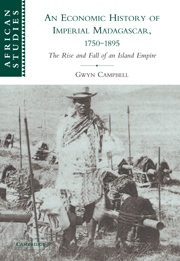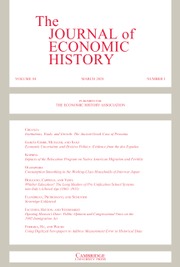An Economic History of Imperial Madagascar, 1750–1895
The Rise and Fall of an Island Empire
CAD$70.95 (C)
Part of African Studies
- Author: Gwyn Campbell, McGill University, Montréal
- Date Published: December 2008
- availability: Available
- format: Paperback
- isbn: 9780521103916
CAD$
70.95
(C)
Paperback
Other available formats:
Hardback
Looking for an examination copy?
This title is not currently available for examination. However, if you are interested in the title for your course we can consider offering an examination copy. To register your interest please contact [email protected] providing details of the course you are teaching.
-
This comprehensive economic history of pre-colonial Madagascar examines the island's role in the burgeoning international economy and the rise of modern European imperialism. It reveals that the Merina of the Central Highlands attempted to found an island empire and, through the exploitation of its human and natural resources, develop the economic and military might to challenge British and French pretensions in the region. Ultimately, their failure (due to imperial forced labor policies and natural disasters) caused the nefarious consequences, attributed to external capitalist and French colonial policies.
Reviews & endorsements
"The great strength and originality of this study, however, lie in the surprising wealth of detailed economic information the author has unearthed about the fascinating attempt of the Merina monarchs to transform their society through education, industrialization, agricultural development, and the manufacture of their own weaponry. Highly recommended."
-ChoiceSee more reviews"...a long awaited publication which fully fulfills the expectations that Campbell's previous work has raised...Campbell's study thus transforms our understanding of Madagascar and its place in the history of the western Indian Ocean region. It is also a model of how economic data can inform social and political historical analysis. This is a highly significant intervention in an era when economic history is battling to retain support especially among Africanists and other scholars of the colonial encounter for whom quantitative data have become unfashionable."
- EH.NET, Nigel Worden, University of Cape Town"Gwyn Campbell is the leading economic historian of Madagascar, a position he has established without publishing a book. For 25 years, he has been producing well researched, well-argued and carefully written articles on the economic history of Madagascar and the Indian Ocean. recently he edited a series of books that emerged from conferences he organized in Avignon on the Indian OCean, but this is the first book he has written. It is worth the wait."
- Martin Klein, University of Toronto"This is a much anticipated work. For the past two decades, this author has been a leading historian of Madagascar and of its palce in the southern complex of the western Indian Ocean. Many will be familiar with his numerous publications on various aspects of Malagasy history that stand as a testament to his scholarship, most notably perhaps those dealing with the island's import and export slave trades in the eighteenth and nineteenth centuries. These are listed fully in the excellent bibliography. Meticulously researched and cogently argued, the author breaks new ground in offering detailed treatment of the economic history of Madagascar in the nineteenth century"
- Pedro Machado, New York University, the Historian"Valuable for world and Africanist historians,...One can only hope that more economic history of this caliber will be written on other parts of Africa"
Jeremy Rich, Canadian Journal of History"This book is an economic tour de force around 'Imperial Madagascar'."
Pier M. Larson, Johns Hopkins University, American Historical ReviewCustomer reviews
Not yet reviewed
Be the first to review
Review was not posted due to profanity
×Product details
- Date Published: December 2008
- format: Paperback
- isbn: 9780521103916
- length: 436 pages
- dimensions: 229 x 152 x 25 mm
- weight: 0.64kg
- contains: 37 b/w illus. 10 maps 38 tables
- availability: Available
Table of Contents
Introduction
1. The traditional economy, 1750–1820: industry and agriculture
2. The traditional economy, 1750–1820: commerce
3. Empire and the adoption of autarky, 1810–26
4. Industry and agriculture, 1820–95
5. Labour, 1820–95
6. Population, 1820–95
7. The trading structure, 1820–95
8. Foreign trade, 1820–95
9. The slave trade, 1820–95
10. Transport and communications, 1820–95
11. Currency and finance, 1820–95
12. Madagascar in the scramble for Indian Ocean Africa
Epilogue. The rise and fall of imperial Madagascar
Appendices
Bibliography
Glossary
Index.
Sorry, this resource is locked
Please register or sign in to request access. If you are having problems accessing these resources please email [email protected]
Register Sign in» Proceed
You are now leaving the Cambridge University Press website. Your eBook purchase and download will be completed by our partner www.ebooks.com. Please see the permission section of the www.ebooks.com catalogue page for details of the print & copy limits on our eBooks.
Continue ×Are you sure you want to delete your account?
This cannot be undone.
Thank you for your feedback which will help us improve our service.
If you requested a response, we will make sure to get back to you shortly.
×



















